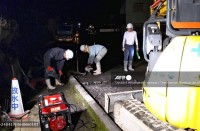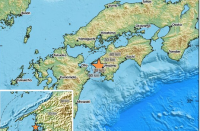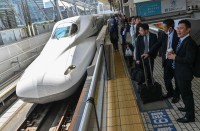
by Anna Smolchenko
Agence France Presse
MOSCOW, Russia (AFP) — Two men accused by London of poisoning former Moscow spy Sergei Skripal denied involvement in the murder attempt in a bizarre Russian media interview Thursday that Britain dismissed as “an insult to the public’s intelligence”.
Speaking with the head of the Kremlin-backed RT news network, the pair confirmed they were the men whose pictures British authorities released this month, but insisted they were visiting the English city of Salisbury as tourists.
British security services had named the men as Alexander Petrov and Ruslan Boshirov, but said these were likely to be aliases.
In a 25-minute interview, the men said these were their real names but insisted they did not work for Russia’s GRU military intelligence agency, as Britain claims.
RT said the men sounded distressed and were sweating as they spoke.
Both appeared to be about 40 years old, and they wore almost identical dark blue jumpers. The men looked well-built and Boshirov wore what looked like a red Kabbalah bracelet.
The TV station recorded the interview on Wednesday evening, just hours after President Vladimir Putin said Russia had identified the men sought by Britain and urged the pair to address the media.
“They are civilians,” Putin said, adding there was nothing criminal about them.
London believes Putin personally sanctioned the attack.
The United States is planning a new set of “very severe” sanctions on Russia over its alleged use of the Novichok nerve agent in the March 4 poisoning of Skripal and his daughter Yulia, assistant Secretary of State Manisha Singh told a congressional hearing Thursday.
She said Russia had until November to allow on-site inspections of facilities linked to the potent poison, and to provide “verifiable” assurances that Novichok will not be used again.
– ‘Insult to public’s intelligence’ –
The Skripal assassination attempt has drawn comparisons with the poisoning of Kremlin critic Alexander Litvinenko with highly radioactive polonium in London in 2006.
Moscow has refused to extradite the two men Britain suspects of killing Litvinenko. One of them, Andrei Lugovoi, went on to become a Russian lawmaker.
Downing Street on Thursday called the RT interview “an insult to the public’s intelligence”.
“More importantly they are deeply offensive to the victims and loved ones of this horrific attack. Sadly, it’s what we’ve come to expect,” Prime Minister Theresa May’s spokesman said.
Skripal and his daughter survived, but a British couple, Dawn Sturgess and Charlie Rowley, came into contact with the same nerve agent in a town near Salisbury months later. Sturgess died.
Petrov and Boshirov said they arrived in Britain on March 2 and travelled to Salisbury the next day to see the sights.
They left after no more than an hour because of poor weather and heavy snow, but returned to the city the next day — March 4, the day of the attack.
British authorities said the suspects travelled to Salisbury twice to prepare for the attack and then carry it out.
– ‘Enjoying English architecture’ –
“Friends have been telling us for a long time we should visit this beautiful city,” said the broad-shouldered Petrov.
“We went there to see Stonehenge, Old Sarum, but we couldn’t do it because there was muddy slush everywhere,” he added, referring to famous local landmarks.
Boshirov, sporting a goatee, denied the pair knew anything about Skripal or the location of his house.
“We walked around and enjoyed this English Gothic architecture,” he said.
British investigators say the poison was transported in a fake Nina Ricci perfume bottle and sprayed onto the handle of Skripal’s front door.
“Is it not silly for decent lads to have women’s perfume?” Boshirov asked. “The customs are checking everything. We didn’t have it.”
The pair said they had previously travelled to Europe for business and pleasure.
– ‘Sent through meat grinders’ –
The men complained their lives had become a “nightmare” and urged journalists to leave them alone.
“We’re afraid of going out, we fear for ourselves, our lives and lives of our loved ones,” Boshirov said. “We are tired.”
When RT editor Margarita Simonyan asked them why they travelled together, implying they might be a gay couple, the men said their private lives were off limits.
“This is not an interrogation,” Boshirov said.
Simonyan said the men had contacted her on her cellphone.
Boshirov and Petrov said they called her because they needed protection and would like an apology from Britain.
British Foreign Office Minister Alan Duncan said their account was “so unconvincing”
“If these two suspects are prepared to answer questions on Russian television, let the.m come here and answer some more searching questions about what we know they did,” he told AFP.







